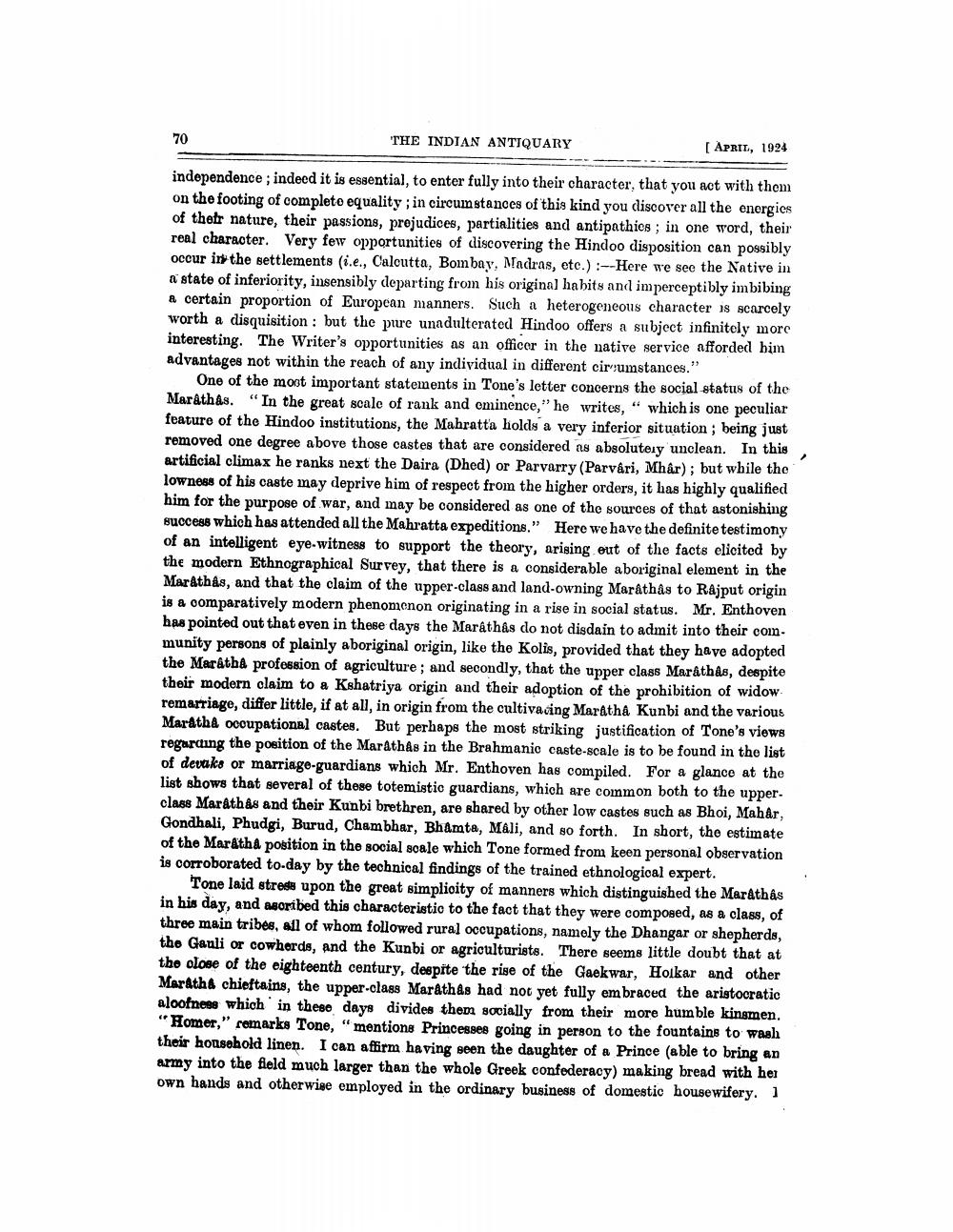________________
70
THE INDIAN ANTIQUARY
APRIL, 1924
independence ; indeed it is essential, to enter fully into their character, that you act with them on the footing of completo equality ; in circumstances of this kind you discover all the energies of thetr nature, their passions, prejudices, partialities and antipathies; in one word, their real character. Very few opportunities of discovering the Hindoo disposition can possibly occur in the settlements (i.e., Calcutta, Bombay, Madras, etc.) :--Here we see the Native in a state of inferiority, insensibly departing from his original habits and imperceptibly imbibing A certain proportion of European manners. Such a heterogeneous character is scarcely worth a disquisition : but the pure unadulterated Hindoo offers a subject infinitely more interesting. The Writer's opportunities as an officer in the native service afforded him advantages not within the reach of any individual in different circumstances."
One of the most important statements in Tone's letter concerns the social status of the Marathas. "In the great scale of rank and eminence," he writes," which is one peculiar feature of the Hindoo institutions, the Mahratta holds a very inferior situation ; being just removed one degree above those castes that are considered as absolutely unclean. In this artificial climax he ranks next the Daira (Dhed) or Parvarry (Parvári, Mhar); but while the lowness of his caste may deprive him of respect from the higher orders, it has highly qualified him for the purpose of war, and may be considered as one of the sources of that astonishing success which has attended all the Mahratta expeditions." Here we have the definite testimony of an intelligent eye-witness to support the theory, arising out of the facts elicited by the modern Ethnographical Survey, that there is a considerable aboriginal element in the Maráthâs, and that the claim of the upper-class and land-owning Marathas to Rajput origin is a comparatively modern phenomenon originating in a rise in social status. Mr. Enthoven has pointed out that even in these days the Marathas do not disdain to admit into their com munity persons of plainly aboriginal origin, like the Kolis, provided that they have adopted the Maratha profession of agriculture; and secondly, that the upper class Marathas, despite their modern claim to a Kshatriya origin and their adoption of the prohibition of widow remarriage, differ little, if at all, in origin from the cultivacing Maratha Kunbi and the various Maratha oooupational castes. But perhaps the most striking justification of Tone's views regarding the position of the Marathks in the Brahmanic caste-scale is to be found in the list of devaks or marriage-guardians which Mr. Enthoven has compiled. For a glance at the list shows that several of these totemistic guardians, which are common both to the upperclass Marathas and their Kunbi brethren, are shared by other low castes such as Bhoi, Mahar, Gondhali. Phudgi, Burud, Chambhar, Bhamta, Mali, and so forth. In short, the estimate of the Maratha position in the social scale which Tone formed from keen personal observation is corroborated to-day by the technical findings of the trained ethnological expert.
Tone laid stress upon the great simplicity of manners which distinguished the Marathas in his day, and agoribed this characteristic to the fact that they were composed, as a class, of three main tribes, all of whom followed rural occupations, namely the Dhangar or shepherds, tho Ganli or cowhords, and the Kunbi or agriculturists. There seems little doubt that at the olose of the eighteenth century, despite the rise of the Gaekwar, Holkar and other Maratha chieftains, the upper-class Marathas had not yet fully embraced the aristocratic aloofness which in these days divides then socially from their more humble kinsmen. "Homer," remarks Tone,"mentions Princesses going in person to the fountains to wash their household linen. I can affirm having seen the daughter of a Prince (able to bring an army into the field much larger than the whole Greek confederacy) making bread with her own hands and otherwise employed in the ordinary business of domestic housewifery. 1




